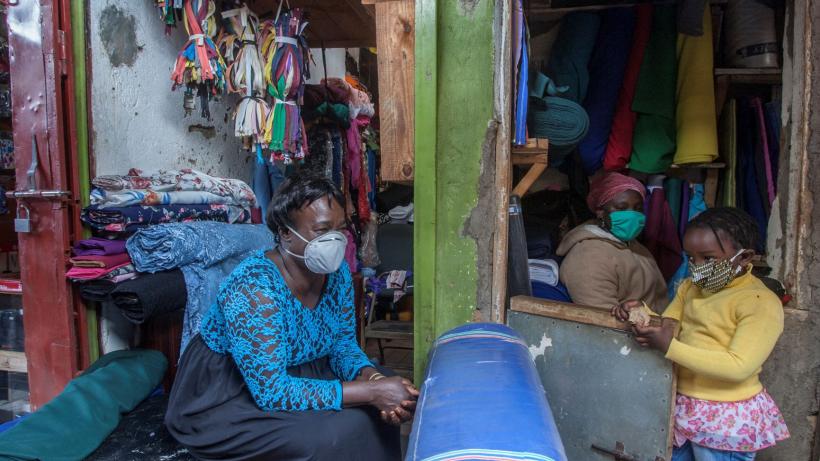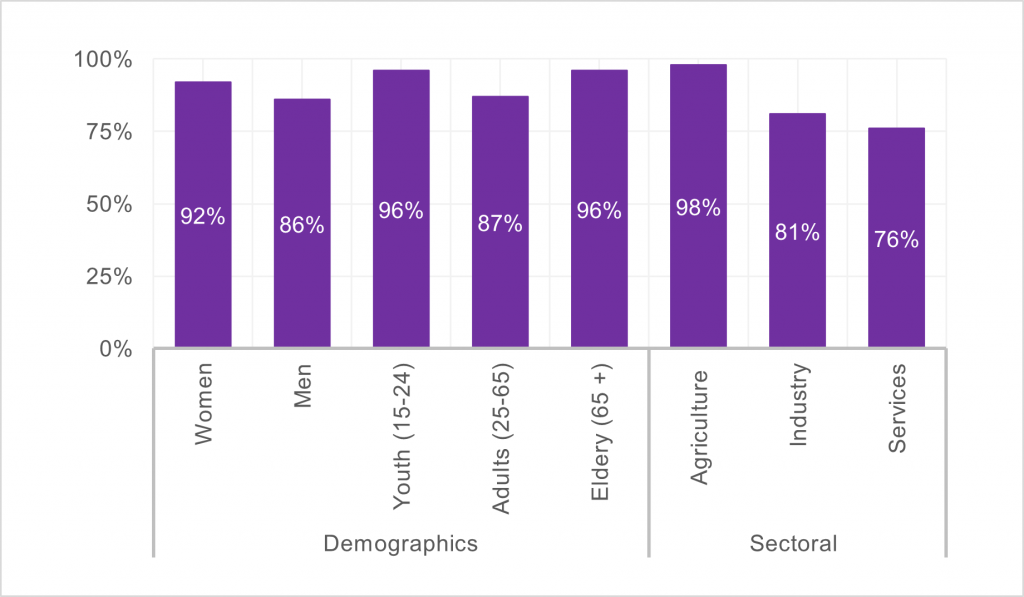
COVID-19 and informality in sub-Saharan Africa: Containing an economic crisis
Containment measures prevent informal workers from sustaining an income. Policies that support the informal sector are required to prevent an economic crisis.
Informal employment involves working arrangements that are not subject to the protection of national labour legislation, income taxation, or entitlement to social protection or certain other employment benefits (see page 26, ILO/OECD, 2019). The pervasiveness and economic relevance of informality in sub-Saharan Africa (SSA) present significant challenges to policymakers who are dealing with the impacts of the COVID-19 pandemic. Ad-hoc measures should be undertaken to combat the spread of the virus in a way that minimises its spread, while appropriately supporting the informal sector.
Based on existing knowledge of informality and the informal sector in SSA, it seems strategic for these countries to adopt tailored and localised lockdowns, while promoting awareness and voluntary compliance. In addition, SSA governments should provide localised financial support to informal sector operators. We recommend they rely on networks of business associations, microfinance institutions, and temporary public service subsidies to improve the effectiveness of these policies.
Informality in sub-Saharan Africa
The ILO (2018) estimates that the informal sector in SSA captures over 70 percent of non-agricultural employment and approximately 90 percent of all economic units, with a contribution of between 30 and 65 percent to gross domestic product (GDP). Informality covers all genders, age groups, sectors (see Figure 1), as well as essential economic activities, such as public transport operations, market centres, and food processing (Boateng and Ampratwum, 2011).
Critical and diverse vulnerabilities are harboured in the informal sector, which expose its workers to the negative implications of external shocks (OECD, 2019). These include:
- Health and safety risks due to the poor health and safety conditions of their working environment, and limited access to public healthcare services.
- Economic risks resulting from a combination of low income, high dependence on daily earnings for survival, and difficulties in accessing credit and social protection.
Figure 1: Sub-Saharan Africa informal sector demographic and sectoral distribution

Source: ILO,2018
Unique challenges of COVID-19 for the informal sector in SSA
Efforts to fight against the COVID-19 pandemic and to contain its negative impacts face unique challenges in contexts of high informality:
- Poverty risk: Given the low and unreliable incomes of most informal sector workers in SSA, the COVID-19 shock is generating severe income and livelihood losses, pushing more people into extreme poverty.
- Containment strategies: Some of the known non-pharmaceutical containment strategies - such as lockdowns, movement restrictions, social distancing, and home-based work policies - are likely to be less effective. This is due to difficulties in regulating the sector; the interpersonal characteristics of informal activities, which often require people to leave their homes; the hand-to-mouth nature of informal jobs; and lack of alternative sources of income, which may induce individuals to ignore imposed regulations.
- Targeting policy: The nature of the informal sector and the way it operates hinder the ability of policies to target and support businesses and workers effectively.
- Fiscal space: SSA countries face increasing financing constraints due to falling tax revenues, foreign exchange distortions, and limited access to international capital markets.
Implications: Containing the spread of COVID-19 in contexts of high informality
- Adopt tailored and localised lockdowns: Blanket and prolonged lockdowns for individuals in the informal sector are too costly to livelihoods and risk causing widespread deprivation as well as unintended health consequences (IGC, 2020). Their effectiveness in containing the spread of the disease is also limited by the fact that a significant number of informal sector workers will be forced to go out to work to avoid starvation - in breach of lockdown regulations (Alon et al., 2020). Moreover, the young age structure of the population in SSA countries, coupled with the known fatality rates for these age groups, reduces the necessity to rely on extended blanket lockdowns (Ibid). Lockdowns should be carefully tailored to suit the local context, and localised to circumscribed hotspots to minimise the broader economic impacts on livelihoods.
- Localised income support: Social protection for the poor (in-cash or in-kind income support) is necessary during the brief periods of tailored lockdowns. It should target the poorest in society, which extends to the most vulnerable segments of the informal sector. For example, street sellers and young women who carry goods for people in the markets. Such support will also incentivise voluntary compliance with lockdown protocols, which would otherwise be ignored for livelihood reasons.
- Intensified awareness creation and trust-building: Targeted efforts to ensure that people in the informal sector comply voluntarily will help to significantly reduce the spread of the virus, and ensure that many can continue to work safely throughout the pandemic. Awareness programmes should target markets and other centres dominated by informal sector operators. Governments could partner with telecommunications companies to share information and updates with their citizens via SMS, delivered on personal mobile phones. To build trust, authorities should provide frequent daily updates on infections and case management, discourage stigmatisation (WHO et al., 2020), and harness the influence of traditional authorities and other relevant stakeholders, such as community leaders, leaders of faith-based organisations, and respected public figures (Banerjee et al., 2020), to improve trust and compliance.
Recommendations: Supporting the informal sector to prevent economic crisis
- Strengthen and support microfinance lending at reduced interest rates. The COVID-19 pandemic is likely to erode the savings and working capital of many informal enterprises. Microfinance, savings and loans, and other financial non-governmental organisations (NGOs) are a major source of finance and capital for the informal sector (Trombetta, 2017). They are best placed to identify struggling businesses and provide demand-driven support. Governments can support credit institutions in providing low-interest loans to informal businesses and workers, and use this as an opportunity to streamline and improve the regulation of microcredit financial institutions if they have not properly done so already.
- Encourage the formation of informal business associations. Governments should support and encourage the formation of unions or informal business associations in strategic sectors of the economy dominated by informal operators. These could be used to facilitate government financial support, improve targeting, better understand informal workers’ challenges and needs, and thus alleviate the negative economic impacts of COVID-19 on informal enterprises.
- Provide temporary subsidies for electricity, water, and rents. Temporary subsidies and waivers provide an effective way of reaching informal enterprises where it matters - by reducing production costs - because previous utility consumption data are often available and can be used to enhance targeting. This form of support can be transparently costed and delivered, and directly reach informal activities, a large portion of which happens within households. Furthermore, such subsidies can subsequently be linked to business registration as a way of promoting formalisation. Among others, this will help countries to create databases for effective targeting in the future.
Read more in the policy brief Informality and COVID-19 in sub-Saharan Africa.

